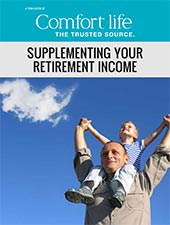Backed by prescience gained through hard-won experience, leaders share how lifestyle and care will evolve in coming years to anticipate and exceed the needs and expectations of older Canadians.

In our Inspiring Leaders Series, we interview visionaries driven by a passion for excellence that’s manifest in Canada’s most innovative retirement communities.
view all.
Marlene Powner, regional operations manager, Sifton Properties, Ltd.

Variety is the key! The boomers are not a homogeneous group.… [Everyone is] unique! And they [like to] take care of themselves! [They’ll want] the hair salon and esthetics… oxygen bars, smoothie bars, [and] yoga classes because that's what they've done, right? You’ll see those services more pronounced.
Brad Bushby, VP of sales, technology, and marketing, Schlegel Villages

Consolidation of the industry is a significant trend…. For example, third-party companies that operate on behalf of an investment trust or a real estate investment trust or a pension fund [with] huge ownerships.… That commoditizes the product [over] single-ownership mom-and-pop retirement communities.… It provides scale and efficiencies in purchasing, sure, [and] may enable the price to stay down a little bit… But of course, Schlegel Villages is very different from that…. a private business owned by a family [whose] entire mission is to bring more of what we do to more seniors.
David Bird, president and CEO, Verve Senior Living

AI, as it gets refined and as it relates to people's health will be important. [There are] lots of wearable devices right now that provide feedback on your health, what you're doing that's healthy, or what you should be doing to improve your health. That will evolve.… [We’ll also see] more advances in predictive technology that will help us care for residents.
Despite all the great work [in] research around dementia and Alzheimer's, there haven't been a lot of breakthroughs in terms of [helping] people living with dementia.… By virtue of the number of people in the baby boom population, we'll see a greater demand for memory care.
Sharon Toor, CEO, Sagecare Inc.

(Note: Sagecare is focused on memory care.)
My ideal would be a 'European village concept'... multiple facilities providing different elements of care, but working together. For example, if the Alzheimer's Society [has a nearby] activity, we can send a resident [to] engage with them…. Other facilities [near us] may be not in the same price bracket as ours, but they're working with us, saying ‘This is what we can help you with.’
That really [came] to the forefront in the pandemic, where we're starting to work a lot better together–versus competitively.
So, if a family member really [needs] our resources, knowing my external friends—I'm not going to call them competitors anymore—my friends who [provide] different or less costly care, I can say [to families], ‘I understand we're not a home right now for you, but here's a community that might be.’ Then we do the referral. And we get referrals from other retirement homes that know ‘this particular client needs you.’ We've had other retirement homes’ team members come to look at our model.
I'm looking forward to working as a cohesive sector versus ‘This is my business.’ That is coming to the forefront more, just like in Europe where everybody works as a team.
We're getting there.
Tanya Snow, director, Bria Communities [0:12]
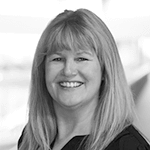
Quality relationships [are going to] mean everything! Understanding the needs of a human in different stages of their life is critical. When someone is not engaged for some reason, it's up to us to fix that. It's up to us to [give] them something that is going to improve their quality of life.
Louisa Flinn, vice president, sales & marketing, PARC Retirement Living [0:40]
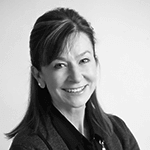
Two things come to mind for me. The first big one is active living, active ageing, no longer one-size-fits-all. It's about living a great life in the last, call it 10 to 15 years of your life, not moving into … I hate to use this terminology because we don't use it, but … moving into "an old folks’ home." It's about moving to an environment where you're with peers, you're actively living a life that is stimulating and that you can count on. So that's the first thing is, there's going to be that.
The second thing that dovetails from that is the demand for that. I think boomers … and I'm a boomer … I think boomers are going to demand that senior living adapt to their needs, and [be] vital and vibrant and have nuances that are different for different types of people. It's not a one size fits all.
I think that they will want to live that healthy social lifestyle. They will be looking for providers to give them that.
Elaine Wood, former vice president of operations, Delmanor [2:06]
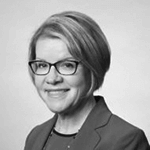
I think we need to be very cognizant of the fact that people are living longer, which is very good news. However, with longevity comes illness at times. So, we do have a dedicated MemoryPlus neighborhood in our Richmond Hill location that has been very successful. And we are planning to build more MemoryPlus neighborhoods. Certainly, we see the need for having a dedicated dementia care neighborhood. Many operators would certainly speak to that in the same lens.
I think it's important to have many different types of service levels. So, if we’re offering, for example, apartment living designed for residents that are just now maybe downsizing from a large home and still wanting some independence along the way with regard to cooking and other things that they'd like to do, then that option will exist within a Delmanor community. And others are doing a similar model.
When we look at, what can retirement operators offer older adults living in a retirement setting, it’s about being able to age successfully and being able to support them to the best of our ability. By offering independent living and assisted living and in some cases, memory care, [this] is definitely a responsibility that we take seriously.
Tony DiFruscio, president, St. Elizabeth Village [3:48]

Seniors are retiring now with a lot more wealth. The boomers are the wealthiest demographic ever to retire. So, they have the means. Now they're looking for the lifestyle to go with that. It's not just about... subsistence, and housing, and food, and a clean place to live. It's about lifestyle, enjoying all the various years of our lives. It should be better, quite frankly, and it is for our independent lifestyle. There's no reason that can't be applied to assisted living and long-term care.
Veronica Da Conceicao, general manager, OPAL by Element [4:24]
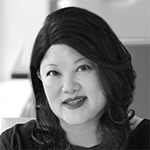
I see buildings in the future that basically have its own little city, where there's stores, there's the doctors, there's everything that's medical, massage therapists, dentists that are nearby, and [all] easy to access because that also allows the residents to embrace independence. OPAL is all about enhancing one's lifestyle, but at the same time fostering their independence. I think the industry needs to understand that. And what can we do, as a whole, to help these residents live as long as possible and to maximize their life as long as possible?
Karim Kassam, co-founder, Optima Living [5:11]

We're about to see the most number of seniors ever in the history of this country. So, the good news for those individuals who are now going to be hitting those years [and asking] where they will want to think about, where do they want to live, how do they want to live, which operator do they want to be supported by? The good news is there's going to be tremendous investment by the public sector and by the private sector to take … some of the approaches that we've had as an operator over the last number of years, but to amplify that significantly.
I think the perspective is going to be that seniors’ housing [and] senior living communities are going to be tremendously attractive two to three years from now because of all of the innovation and investment that's going to be coming into the sector.


